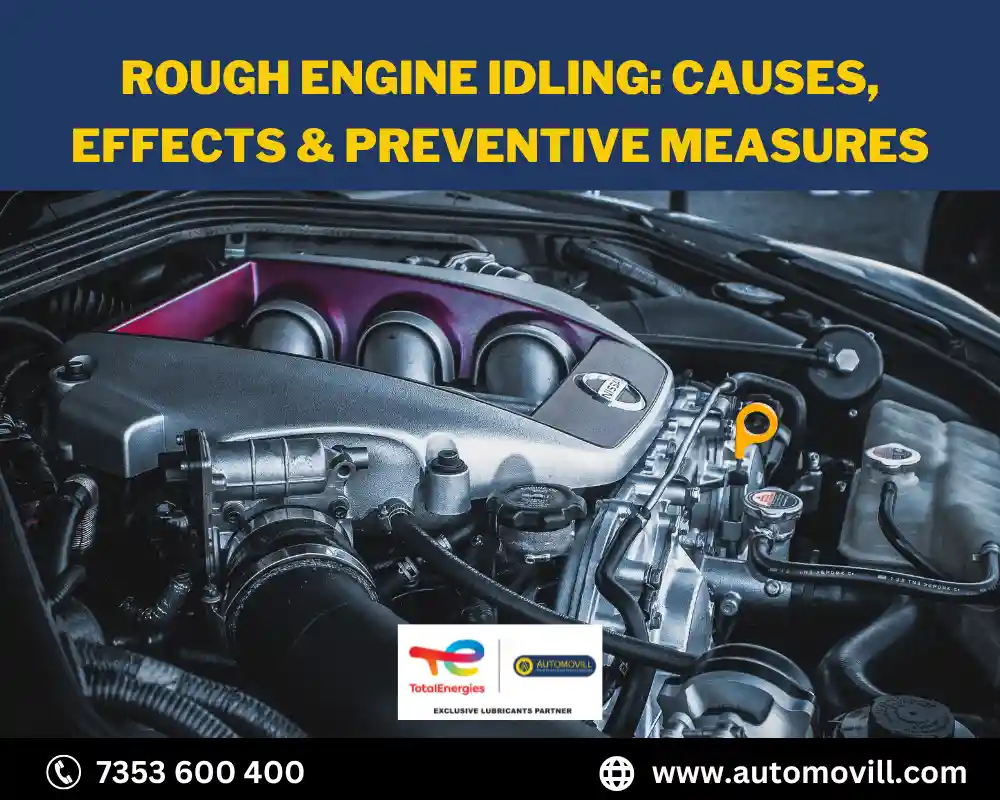
Rough engine idling is a common problem that many car owners experience. It can turn your comfy drive into an annoying experience. When your car vibrates excessively and runs unevenly while idle, it’s a clear sign that something is amiss under the hood.
In this blog, we will explore the causes, effects, and possible solutions for rough engine idling, helping you understand and resolve this issue effectively.
By familiarizing yourself with the causes and solutions outlined in this blog, you’ll be better prepared to address this issue, ensuring a smoother, more reliable driving experience.
Let’s know more in detail about the causes of rough engine idling and their effect on the engine.
Causes of Rough Engine Idling
Here are the possible causes:
1. Faulty Spark Plugs
Spark plugs play a crucial role in igniting the fuel in the engine. If they become worn out or dirty, they may not create a strong spark, leading to rough idling.
Solutions: Regular spark plug maintenance and replacement if needed.
2. Vacuum Leaks
Your engine relies on a system of hoses and gaskets to maintain proper airflow. If any of these components develop leaks, it can disrupt the air-fuel mixture, causing rough idling.
Solutions: checking and repairing vacuum hoses or gaskets
3. Dirty or Clogged Fuel Injectors
Fuel injectors spray fuel into the engine for combustion. Over time, they can accumulate dirt or get clogged, affecting the fuel flow and causing the engine to run rough.
Solutions: Use fuel injector cleaner or seek cleaning services from a mechanic.
4. Oxygen Sensor Failure
Oxygen sensors monitor the amount of oxygen in the exhaust gases to help maintain the right fuel-to-air ratio. If these sensors become faulty, the engine receives incorrect information, resulting in rough idling.
Solutions: Replacing faulty oxygen sensors as soon as possible.
5. Faulty Mass Airflow Sensor (MAF)
The MAF sensor measures the amount of air entering the engine. When it malfunctions or gets dirty, it can provide inaccurate readings, leading to rough idling.
Solutions: Cleaning or replacing the MAF sensor
6. Head Gasket Leakage
A head gasket leak can result in a loss of engine oil within the engine, leading to rough engine idling, knocking noises, and even stalling.
Nevertheless, it’s important to note that rough engine idling or knocking can also be caused by other issues. To confirm whether your car has a head gasket leak, our skilled technicians can conduct a compression leak test. If the test reveals that combustion gases are mixing with the engine oil, it indicates a potential internal failure of the head gasket.
Effects of Rough Engine Idling
- Increased fuel consumption and decreased fuel efficiency
- Excessive engine wear and reduced lifespan
- May need to replace some components
- Risk of stalling or engine failure
- Impact on vehicle emissions and environmental pollution
Diagnosing Rough Engine Idling
- Performing a visual inspection of engine components
- Utilizing diagnostic tools and scanners
- Seeking professional help from a mechanic
Solutions for Rough Engine Idling
- Regular Service: Must give importance to the manufacturer’s recommended maintenance schedule, routine service, oil changes, and filter replacements
- Rectifying Specific Issues: Cleaning or replacing spark plug if required whenever your vehicle goes under service or inspection. Also, identifying and repairing vacuum leaks, clogged fuel injectors, and faulty oxygen sensors promptly
- Seeking Mechanical Help: Whenever you notice any unusual sound or drop in engine performance, you must not ignore it and get your car checked by a skilled mechanic to prevent further damage
- Use Genuine Spare Parts: Always go for genuine parts whenever there is any need of replacing any component of an engine.
Preventive Measures
- Using high-quality fuel and additives
- Use quality coolant
- Use engine oil according to weather needs
- Avoiding excessive idling periods
- Regularly inspecting and maintaining engine components
- Keeping the air intake system clean
Conclusion
Initially, a car with rough idling may seem like a mere inconvenience, but if left unresolved, it can swiftly escalate into more complex issues, including sluggish acceleration, stalling, and eventually rendering the vehicle completely non-active.
By understanding the potential cause, as well as implementing the appropriate solutions with the help of a mechanic, you can resolve this issue effectively and maintain the optimal performance of your vehicle.
Regular service, prompt diagnosis, and seeking professional help, when needed, are essential for a smooth-running engine.
Remember, a proper-maintained engine not only provides a better driving experience but also extends the life of your vehicle.
